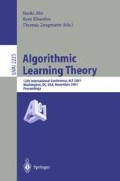Abstract
The main question addressed in the present work is how to find effectively a recursive function separating two sets drawn arbitrarily from a given collection of disjoint sets. In particular, it is investigated in which cases it is possible to satisfy the following additional constraints: confidence where the learner converges on all data-sequences; conservativeness where the learner abandons only definitely wrong hypotheses; consistency where also every intermediate hypothesis is consistent with the data seen so far; set-driven learners whose hypotheses are independent of the order and the number of repetitions of the data-items supplied; learners where either the last or even all hypotheses are programs of total recursive functions.
The present work gives an overview of the relations between these notions and succeeds to answer many questions by finding ways to carry over the corresponding results from other scenarios within inductive inference. Nevertheless, the relations between conservativeness andsetdriven inference needed a novel approach which enabled to show the following two major results: (1) There is a class for which recursive separators can be foundin a confident and set-driven way, but no conservative learner finds a (not necessarily total) separator for this class. (2) There is a class for which recursive separators can be foundin a confident and conservative way, but no set-driven learner finds a (not necessarily total) separator for this class.
Supported in part by NUS grant number RP3992710.
Supported by the Deutsche Forschungsgemeinschaft (DFG) under the Heisenberg grant Ste 967/1-1
Access this chapter
Tax calculation will be finalised at checkout
Purchases are for personal use only
Preview
Unable to display preview. Download preview PDF.
References
A. Ambainis, S. Jain, and A. Sharma. Ordinal mind change complexity of language identification. Theoretical Computer Science, 220(2):323–343, 1999.
D. Angluin and C. Smith. Inductive inference: Theory and methods. Computing Surveys, 15:237–289, 1983.
J. Bārzdiņš. Two theorems on the limiting synthesis of functions. In Theory of Algorithms and Programs, vol. 1, pages 82–88. Latvian State University, 1974. In Russian.
J. Bārzdiņš and R. Freivalds. On the prediction of general recursive functions. Soviet Mathematics Doklady, 13:1224–1228, 1972.
L. Blum and M. Blum. Towarda mathematical theory of inductive inference. Information and Control, 28:125–155, 1975.
M. Blum. A machine-independent theory of the complexity of recursive functions. Journal of the ACM, 14:322–336, 1967.
J. Case, S. Jain, and S. Ngo Manguelle. Refinements of inductive inference by Popperian andreliable machines. Kybernetika, 30:23–52, 1994.
J. Case and C. Lynes. Machine inductive inference andlanguage identification. In M. Nielsen and E. M. Schmidt, editors, Proceedings of the 9th International Colloquium on Automata, Languages and Programming, volume 140 of Lecture Notes in Computer Science, pages 107–115. Springer-Verlag, 1982.
J. Case and C. Smith. Comparison of identification criteria for machine inductive inference. Theoretical Computer Science, 25:193–220, 1983.
M. Fulk. Prudence and other conditions on formal language learning. Information and Computation, 85:1–11, 1990.
E. M. Gold. Language identification in the limit. Information and Control, 10:447–474, 1967.
J. Hopcroft and J. Ullman. Introduction to Automata Theory, Languages, and Computation. Addison-Wesley, 1979.
S. Jain, D. Osherson, J. Royer, and A. Sharma. Systems that Learn: An Introduction to Learning Theory. MIT Press, Cambridge, Mass., second edition, 1999.
S. Jain and F. Stephan. Learning how to separate. Technical Report Forschungsberichte Mathematische Logik 51/2001, Mathematical Institute, University of Heidelberg, 2001.
C. Jockusch. Degrees in which recursive sets are uniformly recursive. Candadian Journal of Mathematics, 24:1092–1099, 1972.
E. Kinber and F. Stephan. Language learning from texts: Mindc hanges, limited memory and monotonicity. Information and Computation, 123:224–241, 1995.
R. Klette and R. Wiehagen. Research in the theory of inductive inference by GDR mathematicians-A survey. Information Sciences, 22:149–169, 1980.
M. Machtey and P. Young. An Introduction to the General Theory of Algorithms. North Holland, New York, 1978.
E. Minicozzi. Some natural properties of strong identification in inductive inference. Theoretical Computer Science, 2:345–360, 1976.
P. Odifreddi. Classical Recursion Theory. North-Holland, Amsterdam, 1989.
D. Osherson, M. Stob, and S. Weinstein. Systems that Learn: An Introduction to Learning Theory for Cognitive and Computer Scientists. MIT Press, 1986.
H. Rogers. Theory of Recursive Functions and Effective Computability. McGraw-Hill, 1967. Reprintedb y MIT Press in 1987.
G. Schäfer-Richter. Über Eingabeabhangigkeit und Komplexität von Inferenzstrategien. PhD thesis, RWTH Aachen, 1984.
A. Sharma, F. Stephan, and Y. Ventsov. Generalizednotions of mindc hange complexity. In Proceedings of the Tenth Annual Conference on Computational Learning Theory, pages 96–108. ACM Press, 1997.
F. Stephan and T. Zeugmann. On the uniform learnability of approximations to non-recursive functions. In O. Watanabe and T. Yokomori, editors, Algorithmic Learning Theory: Tenth International Conference (ALT’ 99), volume 1720 of Lecture Notes in Artificial Intelligence, pages 276–290. Springer-Verlag, 1999.
K. Wexler and P. Culicover. Formal Principles of Language Acquisition. MIT Press, 1980.
R. Wiehagen and W. Liepe. Charakteristische Eigenschaften von erkennbaren Klassen rekursiver Funktionen. Journal of Information Processing and Cybernetics (EIK), 12:421–438, 1976.
T. Zeugmann. On Bārzdiņš’ conjecture. In K. P. Jantke, editor, Analogical and Inductive Inference, Proceedings of the International Workshop, volume 265 of Lecture Notes in Computer Science, pages 220–227. Springer-Verlag, 1986.
Author information
Authors and Affiliations
Editor information
Editors and Affiliations
Rights and permissions
Copyright information
© 2001 Springer-Verlag Berlin Heidelberg
About this paper
Cite this paper
Jain, S., Stephan, F. (2001). Learning How to Separate. In: Abe, N., Khardon, R., Zeugmann, T. (eds) Algorithmic Learning Theory. ALT 2001. Lecture Notes in Computer Science(), vol 2225. Springer, Berlin, Heidelberg. https://doi.org/10.1007/3-540-45583-3_18
Download citation
DOI: https://doi.org/10.1007/3-540-45583-3_18
Published:
Publisher Name: Springer, Berlin, Heidelberg
Print ISBN: 978-3-540-42875-6
Online ISBN: 978-3-540-45583-7
eBook Packages: Springer Book Archive

